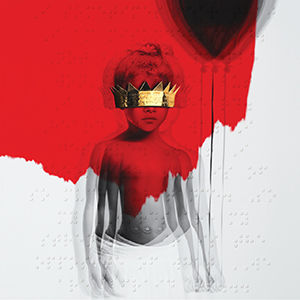
News
Pro-Palestine Encampment Represents First Major Test for Harvard President Alan Garber

News
Israeli PM Benjamin Netanyahu Condemns Antisemitism at U.S. Colleges Amid Encampment at Harvard

News
‘A Joke’: Nikole Hannah-Jones Says Harvard Should Spend More on Legacy of Slavery Initiative

News
Massachusetts ACLU Demands Harvard Reinstate PSC in Letter

News
LIVE UPDATES: Pro-Palestine Protesters Begin Encampment in Harvard Yard
‘Anti’: A Redefining Album
4 Stars
While Rihanna has dominated the radio and clubs for more than a decade, in her new album “Anti” she purposefully shifts away from her previous classic pop style to a tougher and more uncompromising sound. As its title suggests, “Anti” goes against fans’ expectations by reintroducing Rihanna in a more vulnerable light, adding nuance to her seductive and brooding persona. With no pop or pomp to hide behind, both Rihanna and her voice are as naked as they’ve ever been, ironically revealing the “Skin” she sang about previously on her fifth album “Loud” (“No heels/ No shirt/No skirt/ All I'm in is just skin.”) Unexpected and almost overwhelming, Rihanna’s bare, haunting, and risky eighth studio album serves as a tinted yet translucent window into her personal life.
As usual, Rihanna’s voice is the beacon guiding listeners through the haze of smoke that fills her music and surrounds her life. Her voice fluctuates between defiant and indignant (“Consideration”), melancholy (“Desperado”), emotional (“Higher”), and playful (“Work”). Rihanna achieves this incredible range by incorporating elements from different cultures, times, and artists into her music. She uses Jamaican patois in “Work” to enunciate syllables that don’t quite seem to end (“When you ah guh / ...Meh nuh cyar if him”) in a sort of response to Drake’s “Hotline Bling”—Drake incidentally is featured on this song. Rihanna also pulls musical motifs from the past, evoking ‘80s rock with an introductory guitar solo in “Kiss It Better” and ‘60s soul, with “Higher” and “Love on the Brain.” Her cover of Tame Impala’s “New Person, Same Old Mistakes” (here titled “Same Ol’ Mistakes”), while not the most original take on the song, also demonstrates her willingness to work with other artists and styles of music outside of her domain.
This new exploration is perhaps an attempt at satisfying her desire to make more enduring music. “I don't want to perform a lot of my songs because they don't feel like me, so I want to make songs that are timeless" she stated In an interview with MTV. It’s a statement that reflects her reflects her newfound determination to take control of her music and career. Just three albums ago, on “Loud” (2010), Rihanna had no writing credits: Now, she is credited as a songwriter on all the original songs on “Anti.” She points out her new resolve in opening track “Consideration,” an explicit warning to the world that she will do what she feels is right for herself (“I got to do things my own way darling / Will you ever let me? / Will you ever respect me? No”), ironically setting the tone for an even more unapologetic album than her 2012 album, “Unapologetic.”
But “Anti” offers a glimpse not only into Rihanna’s professional life, but also her personal life. Several songs allude to past lovers, from Travis Scott in “Woo” (“Bet she could never made you cry / ‘Cause the scars on your heart are still mine”) to Chris Brown in “Love on the Brain” (“Must be love on the brain / That’s got me feeling this way / It beats me black and blue but it fucks me so good”). Rihanna does not shy away from talking about her love life, down to the last song of the album, piano ballad “Close to You,” which is evocative of her similarly lovelorn 2012 hit “Stay.” With a minute left in the song and album, Rihanna ends singing with a final goodbye (“If you let me, I'd be there by now / Close to you”) to allow the music to speak for itself.
However, while the album succeeds overall in its attempt at revealing a more mature Rihanna, several songs, specifically those added in the Deluxe version, undermine this very idea. “Pose” is initially an erratic mix of incongruous sounds that eventually meld into a less grating but more expected song, emphasized especially by the repetitive, nonsensical lyrics: “Bitch I know you know / Bitch I know you know / Bitch I know / Like wow / All my haters so so broke / Pipe down.” The track is followed by the equally derivative “Sex With Me,” a mediocre rehash of “S&M” (“Sex with me so amazing / Vodka and water and a lemon / And a few other things I cannot mention”). With these so-called bonus tracks, she blemishes an otherwise dynamic and transformative album with disappointing additions that sound more like failed experiments in sound mixing than her typical polished pop.
These bonus tracks notwithstanding, “Anti-” is a satisfying balm to the painful anticipation fans felt awaiting the album’s release. Rihanna’s eighth album is the product of years of hard work (the previous four of which were relatively silent for her), and it pays off. Known for being a prolific singer—she released about an album a year from 2005 to 2012—Rihanna has taken a step back to reevaluate her career, and her patience has been rewarded. “Anti” successfully demonstrates that Rihanna is not only an entertainer, but an artist.
—Staff writer Mila Gauvin II can be reached at mila.gauvin@thecrimson.com.
Want to keep up with breaking news? Subscribe to our email newsletter.

